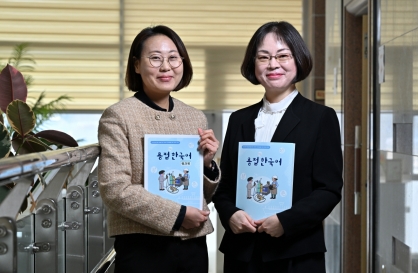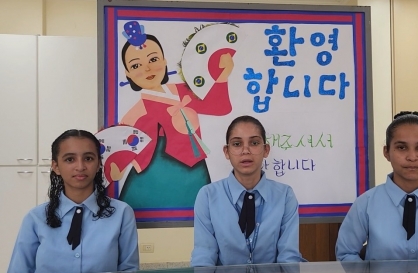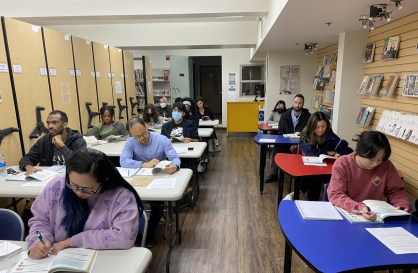Most Popular
Hello Hangeul
-
1
Welding book first in vocational Korean series for foreign labor

-
2
[Korea Beyond Korea] In Sao Paulo, horizons expand for Korean studies
![[Korea Beyond Korea] In Sao Paulo, horizons expand for Korean studies](//res.heraldm.com/phpwas/restmb_idxmake.php?idx=644&simg=/content/image/2023/11/20/20231120000619_0.jpg&u=20231206104853)
-
3
In Brasilia, worldly dreams are born from Korean classes

-
4
Americans seeking to visit Korea learn the language in LA

-
5
[Korea Beyond Korea] Berlin, Europe's Korean Studies hub, nurtures next-gen experts, scholars
![[Korea Beyond Korea] Berlin, Europe's Korean Studies hub, nurtures next-gen experts, scholars](//res.heraldm.com/phpwas/restmb_idxmake.php?idx=644&simg=/content/image/2023/10/18/20231018000929_0.jpg&u=20231023154735)
[Hello Hangeul] Hard truth about Korean dream
Visa complications, job scarcity frustrate foreign students' settlement in Korea
By Jung Min-kyungPublished : May 8, 2023 - 16:07

As their knowledge and understanding of Korea, its culture and language deepen, some Korean learners choose to come to Korea to pursue further studies at Korean universities or graduate schools, with the hopes of starting a career and life here.
But visas and job opportunities are limited, which leads many students to feel that, regardless of the efforts they put into studying here, Korea does not welcome them or want them to stay.
Some of these foreign students end up giving up on their Korean dream or even breaking the rules of their visas.
Dream vs reality
Vlada Ten, a 26-year-old graduate student from Uzbekistan, is fluent in Korean, but says it’s difficult to get a job at a Korean company.
“This is my last semester (as a graduate student). I have been submitting applications to multiple Korean clothing companies, but couldn’t get accepted into any of them,” Ten recently told The Korea Herald.
Ten added that visa issues are a major hurdle when it comes to landing a job in Korea.
“Most foreign graduate students hold a D-2 visa, or study visa, for stays of up to two years, which bans them from working full-time. So many foreign job seekers like me, who are about to graduate, usually fail to get a job due to our visa status, no matter how hard we studied Korean,” she explained.
Under the current law, undergraduate or graduate students who stay in Korea on a D-2 visa are allowed to work up to 30 hours a week. The D-2 visa, which is for students seeking to pursue academic courses at universities in Korea, is valid for two years.
If students wish to start a career in Korea after studying, they must change their visa status to a D-10 visa, also known as the job seeker visa, which allows holders to do job-seeking activities or short-term internships for six months.
Once job seekers are offered a job from local companies in industry sectors designated by the Korea government, they have to apply for an E-7 or other work visa. The E-7 visa is for a specific list of professions and can last up to five years, though shorter contracts are typical.
This means students need to change their visa status to look for a job, and then change it again to start full-time work.
Of course, visa issues are secondary if there are no jobs available in the first place.
Kumar Suraj, a 29-year-old Indian graduate student at Hanyang University’s Division of International Studies, said there is a “gap between education and employment.”
“Many foreign students find it hard to keep track of job openings that accept foreign applicants. They can look for employment opportunities through portal sites, but most recruitment posts are focused on hiring Koreans,” said Suraj, who came to Korea in 2020 after graduating from Delhi University.
To pursue studies in Korean business strategy and marketing, he studied Korean through language courses offered by the Korean Cultural Center in New Delhi and Yonsei University’s online lessons for more than three years before coming to Korea.
Despite his high proficiency in Korean and academic achievements, Suraj is unsure whether he can start a career here.
“There must be job opportunities out there for foreigners like me, but many of us don’t know how to get information about them. It would be nice if more Korean companies and universities could cooperate to host on-campus recruiting programs,” he said.

From students to illegal workers
In 2021, there were 1,611 foreign graduates of Korean universities, according to data compiled by the Ministry of Labor. Of them, 257 were hired by a company in Korea, while 189 continued their education here. Another 193 left the country.
The rest -- nearly 60 percent of the total -- were classified by the government agency as "unable to identify status after graduation.”
“The data means we lost contact with 972 foreign students after graduation,” an Education Ministry official under the team handling foreign students said via phone interview. The official could not confirm whether some of the 972 students have become illegal immigrants.
On that issue, data from the Justice Ministry data offers a clearer picture of what’s going on.
The number of D-2 holders who lost their legal immigration status because, among other reasons, they worked illegally or overstayed their visa, jumped by nearly 600 percent between 2018 and 2022. The number, which was 1,419 in 2018, reached a total of 9,817 in 2022, according to ministry data released recently via a lawmaker in Korea. D-2 holders are mostly undergraduate or graduate students.
The corresponding figure for D-4 holders, or those enrolled in language courses, more than doubled from 12,613 in 2018 to 25,726 in 2021, the data showed.
Difficulty in sorting out visas and finding jobs in Korea are not the only reasons for the exponential growth in these numbers, experts say. Rather, they point to a brokerage structure that connects foreigners who wish to find jobs here and local educational institutions who wish to attract enrollees.
“As the student visa has become an easy pathway for foreigners who come to Korea to find jobs, the number of foreigners who leave school after finding employment has increased,” said Kim Hyun-mee, an anthropology professor at Yonsei University, in a 2020 report.
“These universities, which often lack the ability to retain international students based on their merit, have to hold hands with private brokers to help their graduates get a job. But these institutions fail to provide these students with the necessary education or professional skills to boost their career.”
Kim pointed out that the current government policies, or rather the lack of them, only push international students to become low-income laborers in Korea.
“Intentionally or unintentionally, this creates room for 'illegal' or 'unlawful' labor (by student visa holders). The number of international students who work in labor-intensive jobs with low wages, whether legally or illegally, is increasing, while those with expertise and academic qualifications are struggling to find employment in the domestic labor market.”
Removing the hurdles
As South Korea considers immigration as one of the solutions to address its population crisis, calls are growing for measures to retain those who come to Korea to study.
A ruling party lawmaker has recently proposed a bill aimed at helping people transition from the D-2 student visa to E-9 visas, which are issued for manual work. By addressing the visa issue, the government hopes to improve hiring opportunities and working conditions for foreign students.
“We should never take the foreign students wishing to study in Korea and build a career here for granted,” People Power Party Rep. Hong Seok-joon said during an interview on Thursday.
“Korea is struggling with issues tied to an aging society and a workforce shortage, which is why it is crucial for us to help foreign residents and students settle in smoothly. The current system creates hurdles for foreign students and residents to live comfortably here,” he added.
The E-9 visa, which Rep. Hong's bill deals with, currently allows them to work here for up to four years and 10 months. The government plans to extend the maximum stay period to up to 10 years in the near future.
Professor Kim also called for a virtuous cycle between the country’s labor policies and programs for retaining international students to resolve issues surrounding international students and their illegal work here.
In January, the Justice Ministry said it would launch a system tentatively titled “Study Korea 3.0” by the end of June this year which aims to help over 166,000 foreign students residing in Korea successfully settle down here.





![[Herald Interview] How Gopizza got big in India](http://res.heraldm.com/phpwas/restmb_idxmake.php?idx=644&simg=/content/image/2024/11/20/20241120050057_0.jpg&u=20241120164556)

![[KH Explains] Dissecting Hyundai Motor's lobbying in US](http://res.heraldm.com/phpwas/restmb_idxmake.php?idx=644&simg=/content/image/2024/11/20/20241120050034_0.jpg&u=)

![[Kim Seong-kon] Farewell to the vanishing John Wayne era](http://res.heraldm.com/phpwas/restmb_idxmake.php?idx=644&simg=/content/image/2024/11/19/20241119050096_0.jpg&u=)
![[Graphic News] 70% of S. Koreans believe couples can live together without tying the knot: survey](http://res.heraldm.com/phpwas/restmb_idxmake.php?idx=644&simg=/content/image/2024/11/19/20241119050098_0.gif&u=)

![[Korea Beyond Korea] In Sao Paulo, horizons expand for Korean studies](http://res.heraldm.com/phpwas/restmb_idxmake.php?idx=644&simg=/content/image/2023/11/20/20231120000619_0.jpg&u=20231206104853)


![[Korea Beyond Korea] Berlin, Europe's Korean Studies hub, nurtures next-gen experts, scholars](http://res.heraldm.com/phpwas/restmb_idxmake.php?idx=644&simg=/content/image/2023/10/18/20231018000929_0.jpg&u=20231023154735)







![[Today’s K-pop] Blackpink’s Jennie, Lisa invited to Coachella as solo acts](http://res.heraldm.com/phpwas/restmb_idxmake.php?idx=642&simg=/content/image/2024/11/21/20241121050099_0.jpg&u=20241121172748)